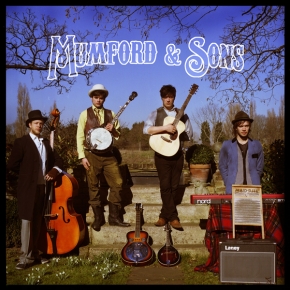EARLIER THIS YEAR, in the midst of an otherwise very generous consideration of the merits of Mumford & Sons, Tom Breihan off-handedly commented, “They dress like assholes.” Soon after that, I read an interview conducted by my friends Tim Bracy and Elizabeth Nelson Bracy with another friend, James Toth, in which James torpedoed the Mumfords on similar grounds, saying that their attire was in conscious imitation of (to state the obvious: the incalculably superior) the Band, and ridiculous on its face because the Band only ever dressed the way Mumford & Sons dresses in a single photo shoot.
I see things a bit differently.
First, for those of you who are unfamiliar with the “look” of Mumford & Sons: it’s extremely vest-centric, heavy on wide-brimmed hats and facial hair. It would be exaggerating to say that the Mumfords resemble Amish people, but if you were to drop them into the background of a bank robbery scene in a Dillinger biopic, they would not appear out of place. One suspects that they have at least one full-time haberdasher at their disposal. In other words, I have to grant that Tom Breihan and my friend James Toth are correct, at least up to a point.
On the streets of Williamsburg or Austin or Silver Lake, to adopt such garb is a clear affectation. Why should a twenty-something wear the duds of a Dust Bowl-era laborer? Because they feel like it looks good, I guess. Personally, I don’t give a shit. If you want to dress like Tom Joad, go ahead. But I recognize the objection. It is costume dress, and in day-to-day situations – at the supermarket, at the car dealership, at the post office – if you wear a costume you transmit insincerity. Proceed at your own risk.
However, I would argue that, for one simple reason, applying day-to-day standards to the Mumfords’ ensembles is absolutely wrong: they are performers. Why should David Bowie or Lady Gaga be allowed to have a space-alien get-up, but the Mumfords not have vests? What about the Ramones and their leather jackets? What about K.I.S.S., for God’s Sake?
Furthermore, in contrast to the day-to-day situations mentioned above, in a performative context – i.e. on stage in front of an audience – couldn’t it be argued that a costume is an expression of commitment to the role of entertainer?
Tim, I’ve heard you talk about your seminal concert-going experience, a late-eighties Replacements show. Now picture them dressed as pirates. Does that ruin the show?
Tim Bracy:
It comes as little surprise that Owen would mount a vigorous, lawyerly, and largely persuasive argument in favor of Mumford’s dress code, and particularly that of his Sons, with whom he has long expressed an especially well-developed sympathy. (If I had ten cents for every time Owen has privately confided to me his view that “the Sons” need only break from their oppressive “Father-Master “in order to “solve music,” I would have saved a lifetime’s fare to the Port Authority.) Having lauded his rhetoric, I must now impugn his logic, forced by the hand of reason to deflate the delusional musings of my dear friend, in such a manner which I hope does not have long term ramifications for his overall confidence and efficacy. To begin:
Owen would have us believe that the great artist David Bowie’s history of dressing as a space alien, amongst many other personae, has in some way indemnified other rock groups of lesser vision and talent from criticism over their high-concept wardrobe escapades. In a sense, he is correct. Amongst the many, many extraordinary achievements of Bowie’s career has been his uncanny talent for existing at the vanguard of the music and fashion, or if you will, sound and vision. Almost always, with impeccable attention to detail and a courageous attitude toward pushing avant-garde buttons, he has used his music to elevate his appearance and his appearance to elevate his music. In that regard, he forever upped the ante for rock as visual spectacle and personality cult. Mumford and Sons, to draw a contrast, put on hats. They wear vests. They write lousy songs rendered in a highly retrograde fashion. Their remarkably tedious, anachronistic, by-the-book ‘roots music’ not only has nothing novel to offer the tradition, it veritably revels in its cynical capacity to reduce the most easily identifiable and marketable traits of folk and country into festival-crowd-pleasing tripe. The costumes in this case are the most obvious signifiers. When Bowie actually took Ziggy Stardust to the stage and mimicked sucking off lead guitarist Mick Ronson every night, it wasn’t exactly comfort food. It’s not Mumford’s responsibility to strip off that vest and get a little loose with Sons, but I’d sure like them a hell of a lot more if they did. (DO IT MUMFORD!)
The case comparing Mumford with K.I.S.S. is more compelling. Certainly no one was ever more cynical than K.I.S.S., and I love K.I.S.S., so maybe this will prove me out on the wrong side of history. But even still, I can’t help but feel that Mumford’s hat can never be considered in the same creative terms as a drumming cat. And a fire breathing demon! And a space alien! And a Star Child (space alien?) I mean, no band has ever been more stridently Kapitalist then K.I.S.S., but you can’t say they didn’t at least get ferociously weird. As noted before, Mumford wears vests. That’s kind of the sum total.
So I guess my argument against the Mumford apparel is twofold: it feels both like a cynical shortcut towards a mass festival audience who wants Civil War Recreation-style folk music before Daft Punk arrives, and also like the laziest costume drama ever to get over big in pop music terms. I don’t hate them, I just think we can all do better. But now I am getting lightheaded. I reckon I will go watch the Replacements on YouTube and turn this over to Elizabeth (serenity now)…
Elizabeth Nelson:
Hey guys, thanks so much for the invitation to participate in this dialogue.
I’m on record as being, let’s just say, less than a fan of the music of Mumford & Sons, so it might come as a surprise to all and sundry when I say that I have something of an enormous reservoir of sympathy for Marcus Mumford & his Sons when it comes to their current sartorial state of affairs. Do I “love” their look? I do not. I think it’s just as ridiculous as the next person and I find myself feeling especially deeply troubled when that one Son elects to go full-on Bill the Butcher but decides to wear a trucker cap instead of a top hat. That bugs me.
But here’s the thing: I feel like, at this point, Mumford & Sons are kind of at an awkward impasse, and they would be remiss if they didn’t wear the old-timey suits. Look, I have no idea what happened the first time these outfits became a part of the Mumford brand – in my mind I’m seeing a stressed-out Marcus, maybe a little bloated or something at a photo shoot or TV performance, and some stylist or whatever being like, “Here, put this vest on – it hides a multitude of sins,” and from there it was all over but the shouting (and oh, God, it’s so annoying when they shout). The Sons had to follow suit, so to speak, and the next thing you know, Mumford & Sons are the face of Sears & Roebuck ca. 1897.
But now what? These guys can’t just STOP wearing the costumes in the same way that DEVO can’t stop wearing hazmat suits and energy domes. Tim and Owen both brought up K.I.S.S. – do you guys remember the backlash experienced when those guys took off the makeup? People were PISSED. I mean, I’m guessing people were pissed, I feel like at a minimum they were pretty resoundingly mocked by everyone. Mumford & Sons would be staring down a shitstorm of additional criticism if all of a sudden they decided to start wearing skinny jeans or capes or a smoky eye and a bold lip. As our friend Sean Fogarty said about the band Clinic, “Once you put the mask on, you can never take it off.” Tim – do you remember the day that you realized you were being exclusively painted with the “alt-country” brush? How did that make you feel? How’s getting away from that going for you? Or James, you have occasionally made reference to “putting on the funny hat” early in your career – what was that like? We should feel a little bad for the Mumfords, who are more constrained right now than a set of testicles in a pair of high-waisted trousers. And how do you think it’ll go for them when they’re pitted against the Lumineers in a “who wore it best?” showdown in US Weekly?
James Toth:
I was prepared to offer a reasonable rebuttal to Owen’s provocative and insightful salvo, but Tim and Elizabeth really answered the bell here, so I think I’ll take a different tack. It is true I am bothered by the way that the members of Mumford & Sons clothe themselves, and not by Bowie-as-Spaceman. I’m not sure how I’d have reacted to a peg-legged, swashbuckling Westerberg, but, upon considering it, maybe I’d have been down with that, too. It’s tempting to blame our collective disapproval of Mumford and his dashing Sons on the cynicism that comes with advanced age (in indie rock years, the four of us are practically geriatrics), but I think it’s something else. Owen raised a point, to which Tim and Elizabeth provided a valuable and well-articulated counterpoint; it would seem that my task is to now offer a tangential digression. Within these guileless reminiscences, however, I will argue that it is an epidemic of irony that causes we True Believers to squint sideways at those who would take sartorial cues from Deadwood, and not the music they make, which is, for the purposes of discussion, immaterial.
When I was young, Dio videos scared the bejeezus out of me. I thought Ice Cube really engaged in shootouts with police, and that Ricky “The Dragon” Steamboat actually did have to have an operation after Randy “Macho Man” Randy Savage dropped a particularly fierce elbow on his throat. Everyone I knew enjoyed “Walk Like An Egyptian,” though I suspect punks hated it (not like the bemused indifference with which they would likely regard it now). I enjoyed nothing ironically.
Irony itself is no recent phenomenon: Heidegger cites Socrates as the first ironist, and from Oscar Wilde to Alanis Morrissette, many pompous and privileged people have been wielding (and fundamentally misunderstanding) it ever since. But it was a particular strain of irony that began to encroach on our beloved music scene around the time of grunge, giving way to a rise in thrift-store t-shirts, political and sexual ambiguity, and surly disaffection. Instantly, the attendant fashions of ‘alternative rock’ invaded mainstream culture, swiftly becoming homogenized and uninteresting in the process (see also: breakdancing). Never again would mullet-haired Dairy Queen employees earnestly slow dance to what was now retroactively and pejoratively known as ‘hair metal’; the modern tween was instead snickering all the way to Best Buy to buy a CD by The Darkness, somehow convincing him or herself that the joke was on The Darkness.
I submit this wrinkle in time as a cultural epoch, and the reason why Mumford’s London lads bother me so much, and why Alice Cooper’s shenanigans do not. It isn’t that I’ve become the jaded, cranky record-store guy I’d secretly always wished to be, but that I simply cannot find time in my life to accommodate ironic enjoyment of anything, and for me to enjoy a Mumford and Sons concert would require a suspension of disbelief that would give a magical realist an ulcer. Thing is, I believed Dio when he brandished the sword, mostly because he wasn’t smirking when he did it. This is why all the previous examples—K.I.S.S., Ramones, Gaga, et al – do not compute. These mavericks, as Tim points out, upped the ante for rock as a visual spectacle. In contrast, there isn’t a corpse-painted feline-man or a Ziggy Stardust (or even, God help me, a Chris Gaines) within the ranks of Mumford and Sons, no invented personas that would indicate any kind of liberated imagination. They’re just wearing somebody else’s costumes.
The rock and roll ‘look’ is no longer a curious incongruity; rather it has become perfectly acceptable to be spotted at the post office dressed like a refugee from a gypsy encampment. And America no longer cranes its neck to see where in the parking lot you might have parked your spaceship; it doesn’t quietly speculate as to the number of corpses you have stockpiled beneath a false floor in your makeshift dungeon. Instead it asks a question that musicians used to hate, but now, I suspect, they welcome: Are you in a band?
~






I guess I’m with Owen on this. If Mumford & Sons didn’t suck, no one would care what costumes they wore. Their music feels insincere and cynical and pandering (and they know it!), and the outfits fit that narrative. The trucker hat seems calculated rather than just goofy because that’s how everything about the band seems. And now it’s too late—any new costume theme, regardless of whether it accompanies a shift in musical direction, will seem just as phony.
I think the whole costume vs. musical ability discussion should take precendence. Lady Gaga can’t read music, and she looks ridiculous. David Bowie can read music and he also looks ridiculous. But that ability of his to move across musical genres and change visual style while doing so has more to do with his musicality than anything else.
What about Sun Ra? Or Miles Davis? Those cats could really cook, and they got into some strange ass uniforms.
As for Mumford et al. their style is a reductive one crafted more by stylistic impulse and manipulative hopes than by skill. Their music is crud, their look is too. Should they have a right not to be completely disregarded because of their vests? That’s not the point. The music is. And musically they’re so lamebrained, as a host of people have noted previous to me and including Owen King, now everyone has to look at them to believe it and then, whammo, it’s the whole Band circa 1968. It’s not about skill, this rock and roll. It’s about bombast and dynamics and business. And so, now a million years after it started, it’s boring to look at ( Mummers) boring to listen to ( Gaggers) and boring the argue about. There are funk records from the 70s made by people in whacked costumes and they sound better, they look better, and are much more fun to read about. That is not to say I didn’t enjoy this essay because I TOTALLY LOVE IT!
Contrary to the common misconception, KISS does not take its name from Knights in Satan’s Service. It is not an acronym. FFS